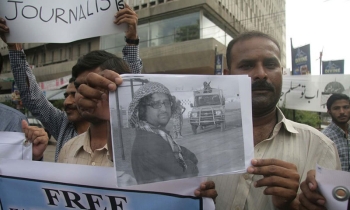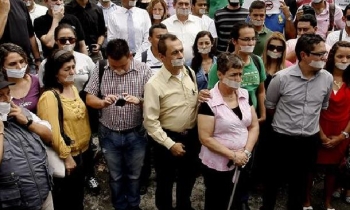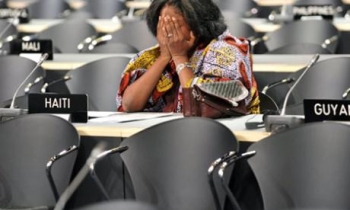The press in Bangladesh is fast being forced into a corner with all arms of the establishment ganging up to clamp down on journalists. The last move comes in the form of an annoucement of the chairman of the country's press council that all relevant political figures have agreed to amend a crucial provision of the Press Council Act.
 Riot police beat a group of opposition activists during a rally in Dhaka, Bangladesh, Tuesday, November 22, 2005. Sporadic acts of violence were reported Tuesday as thousands of opposition supporters marched toward the Bangladeshi capital to attend a rally demanding the government's resignation and fresh elections. (AP Photo/Sawkat Jamil)
Riot police beat a group of opposition activists during a rally in Dhaka, Bangladesh, Tuesday, November 22, 2005. Sporadic acts of violence were reported Tuesday as thousands of opposition supporters marched toward the Bangladeshi capital to attend a rally demanding the government's resignation and fresh elections. (AP Photo/Sawkat Jamil) "The president, the prime minister, and the information minister have expressed their willingness to amend the provision of the Press Council Act related to the power to warn, admonish and censure the press," the chairman of the council, Justice Abu Sayeed Ahammed, said in the council's annual report 2004 placed in parliament Wednesday.
"I am in favour of adding a punitive provision to the act to make it effective and to strengthen the council," Justice Ahammed, said, according to a 'The Daily Star' report. Justice Ahammed, who was appointed the chairman of Bangladesh Press Council on May 26 this year, said amending the law was an urgent matter.
He said that the Press Council Act 1974 should also have some "executive force" so that the council can force anyone to comply with the law and ensure punishment to law violators. The press council report's was placed amid the ruling alliance lawmakers' blistering attack on the media and demand for the enactment of tough laws to punish journalists for what they called "fake news."
The Bangladesh Obsever, one of the oldest dailies in the country, reacted in an editorial on Friday, "Curbs on the press will not help. It will only further alienate the government from the vast majority of the people. It is through the press that the government comes to know what the nation is thinking. It seems the current government is not interested to hear anything adversarial. They only want the good tidings. The kind of stuff dished out by their sycophants."
 A Bangladeshi shopkeeper displays newspapers for sale in the morning in Dhaka November 15, 2005. Journalists in Bangladesh admit their profession is not always practised for the right reasons. Businessmen often start newspapers simply to gain access to the corridors of power; there are around 130 dailies published in Dhaka alone. Corruption is everywhere – Transparency International ranked Bangladesh bottom of its global corruption index in each of the past five years – and journalism is no exception. (Reuters/Rafiqur Rahman)
A Bangladeshi shopkeeper displays newspapers for sale in the morning in Dhaka November 15, 2005. Journalists in Bangladesh admit their profession is not always practised for the right reasons. Businessmen often start newspapers simply to gain access to the corridors of power; there are around 130 dailies published in Dhaka alone. Corruption is everywhere – Transparency International ranked Bangladesh bottom of its global corruption index in each of the past five years – and journalism is no exception. (Reuters/Rafiqur Rahman)Members of parliament have been demanding that the press council should be strengthened as they believe that the existing law is inadequate to control the media. The existing provision in the law empowers the press council to warn, admonish or censure the editor or journalist of a newspaper or news agency, if it is proved that they committed any professional misconduct or breach of the code of journalistic ethics.
The provision also provides for an opportunity of hearing of the editor or journalist concerned and for holding an inquiry as prescribed in the act. Justice Ahammed said in the report that the provision was being violated frequently. "I hope the ministry concerned will immediately concentrate on the issue to bring an acceptable amendment to the law," he suggested.
The New Age said on Friday, "These amendments are expected to encourage all and sundry to take legal action against newsmen and newspapers on the spurious ground of yellow journalism because no one is sure who will determine what is yellow and what is not and how they will go about doing it. We are in fact afraid that with such a questionable law in their hands, some quarters, especially politicians whose corrupt doings are regularly reported on, will get tempted to paint every report yellow."
A recent report by Media Monitor South Asia that violence, both physical and verbal, against mediapersons has been quite pronounced in Bangladesh. Fewer journalists have been killed this year so far, but there has been a visible growth in intolerance from both religious and leftist extremists who indulged in bomb attacks and killings of mediapersons. Some press clubs and media houses were ransacked, even bombed. The ruling establishment, on the other hand, has abused, filed criminal cases, threatened, and even used violence against mediapersons.
The report said that the involvement of the youth and students wings of political parties, including those in the government and their allies, has prevented prompt action by the civil administration including the police. It also referred to a statement by a cabinet member and politico-religious party leader declaring "over-exercise of democracy and press freedom" being the reasons for Bangladesh's image crisis. Journalists were not spared even by the judiciary which slammed prison sentences and imposed fines on them in "contempt" cases.
 Grief-stricken colleagues of Manik Saha, a correspondent for the daily New Age and the BBC World Service. Saha was killed on January 25, 2004 when a homemade bomb was thrown at him as he was travelling on a scooter. He had been under threat as a result of his reports about the illegal activities of local criminal gangs. Several suspects detained by the police in April called Saha an "enemy of the proletariat."
Grief-stricken colleagues of Manik Saha, a correspondent for the daily New Age and the BBC World Service. Saha was killed on January 25, 2004 when a homemade bomb was thrown at him as he was travelling on a scooter. He had been under threat as a result of his reports about the illegal activities of local criminal gangs. Several suspects detained by the police in April called Saha an "enemy of the proletariat."Journalists in Bangladesh are regularly threatened or eventually killed by criminal gangs and Islamic fundmentalists. Nine journalists have been murdered in the country because of their work since 2000, making it one of the most murderous places for a journalist to work in. Bangladesh was ranked 151 by Reporters sans Frontières (RSF) in its Worldwide Press Freedom Index 2005.
RSF recently said that politicians from both sides accuse the media of trying to destabilise the country through their reporting. Over the past few years, the government has been particularly critical of both domestic and foreign reporting about signs of Islamic extremists operating in the country.
"It's very ironic. You find that whenever you find that these politicians are in the opposition, they advise us to become more bold, courageous and very free," the head of the Bangladesh Federal Union of Journalists (BFUJ), Iqbal Sobhan Chowdhury, was quoted as saying in a recent report by the Voice of America (VOA). "But whenever they come to power, they advise us to restrain ourselves to become objective�. You can call it sweet and sour relations between the politicians, the rulers and the journalist community."
The Observer wrote, "The press has played a significant role in unearthing the activities of Islamic militants at a time when the government was saying that they do not exist. Now that the problem can no longer be ignored they are once again blaming the media this time on the plea that legislative privilege has been undermined. There is no greater interest than the national interest and the government should try to serve it rather than coterie interests."









